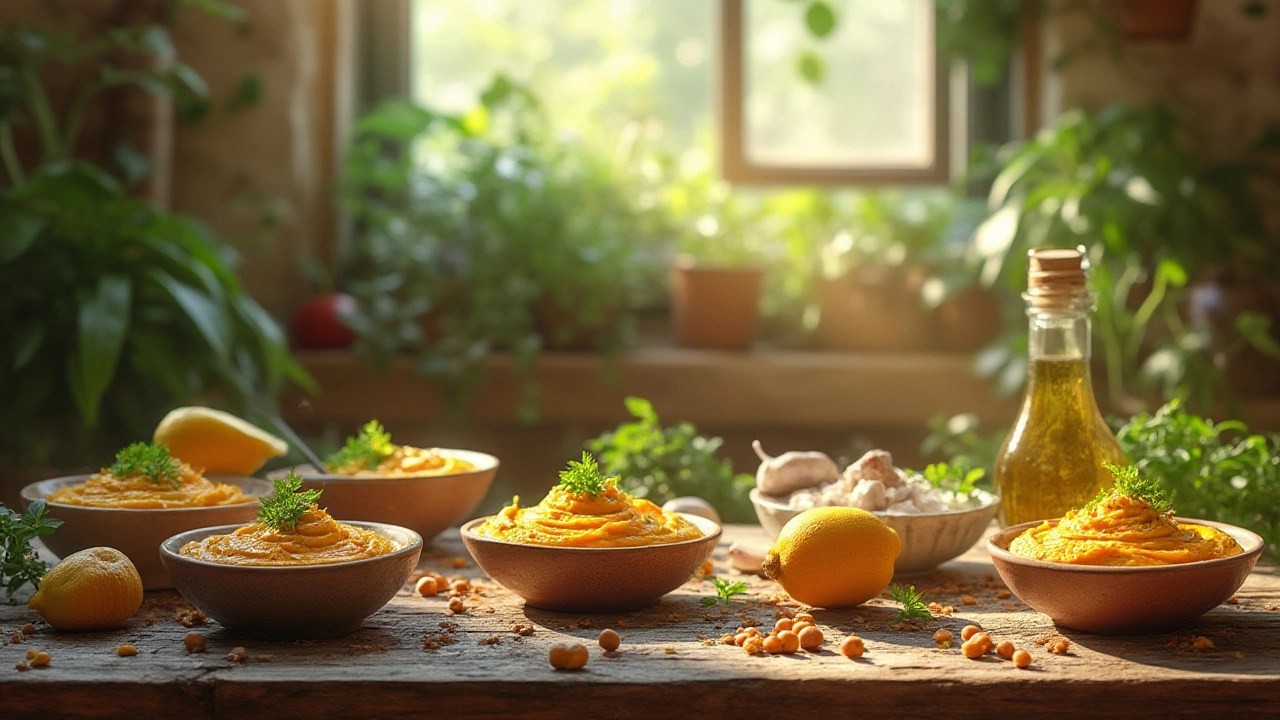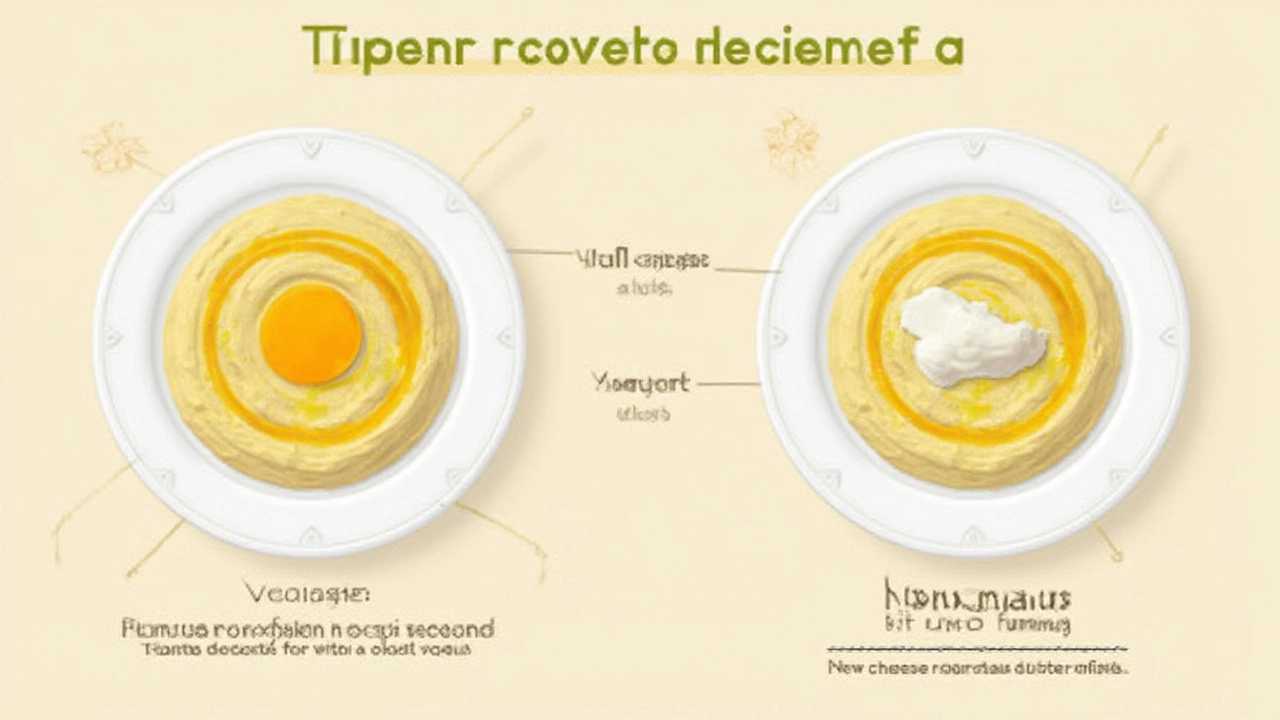
Ask anyone who’s switched to a vegan diet about their go-to dip, and nine times out of ten, they’ll mention hummus. Its silkiness, rich flavor, and punchy garlic twist land it on everything—from pita triangles to veggie sticks. But is hummus truly vegan, or could there be hidden animal products lurking in your favorite spicy tub? If you’ve ever raised an eyebrow over the ingredient list or felt a flicker of doubt scooping up that creamy dip, you’re not alone. Hummus seems so plant-based it almost feels silly to question, right? But when it comes to labeling something as vegan, sometimes things aren’t quite as obvious as they seem.
What’s Really in Traditional Hummus?
Okay, let’s break down the basics. Traditional hummus has been around since ancient times, and its ingredient list is refreshingly simple. You’ll find chickpeas, tahini (which is just ground sesame seeds), fresh lemon juice, olive oil, garlic, and a dash of salt. Each ingredient is completely plant-based. That’s why hummus shows up at just about every vegan potluck or Mediterranean restaurant—it’s vegan by design. The humble chickpea handles the protein, tahini kicks in those healthy fats, and olive oil gives each bite that luxurious smooth feel.
Old-school recipes don’t mess with this formula. Even the classics you buy in Middle Eastern markets stick to that honest, straightforward list. Curious fact: historians say hummus was being eaten as far back as the 13th century, which means it’s been brightening up tables for way longer than plant-based fads have been around. And if you’re wondering about hidden traps, none of these ingredients scream ‘animal-derived.’
But here’s where things start to wobble. Mass-produced hummus or flavored varieties sometimes throw subtle curveballs. Classic brands like Sabra or Cedar’s typically keep things vegan, but always scan the label anyway. Sometimes you’ll see added stabilizers, preservatives, or even yogurt in certain blends.
Bottom line: if you’re making hummus the old-fashioned way or picking up a tub that sticks to the traditional six, there’s no animal sneaking around. You can spoon it onto your salad or eat it by the pita-load, guilt-free. But don’t get too comfortable just yet—the hummus world is a big, bold place, and not every tub is as pure as you'd think.
Hidden Animal Products: The Sneaky Non-Vegan Hummus Ingredients
You probably thought, "Chickpeas, tahini, olive oil—what could go wrong?" Here’s the wild part: companies often add stuff for creaminess, shelf life, or to appeal to everyone who isn’t a hummus purist. Sometimes, the trickiest things sneak under the radar. One notorious offender? Dairy. That sneaky swirl of Greek yogurt or sour cream pops up in ‘creamy’ or ‘low-fat’ hummus blends to win over non-vegans. It might seem innocent, but for vegans, it’s a hard pass.
Then there’s honey. Some brands try to stand out with “sweet and spicy” flavors, adding honey to their cinnamon or sriracha blends. For anyone sticking to plant-only foods, even a tiny drizzle of honey makes that hummus a no-go. Some roasted red pepper flavors, too, add cheese or even milk powder. That tangy punch isn’t always lemon—it’s sometimes disguised as feta or goat cheese. Restaurants sometimes drizzle a yogurt-based sauce over their hummus presentation to fancy it up. If you’re eating out, it pays to ask your server what’s in the dip (even if it means being that person at the table).
Another thing most folks wouldn’t think about: cross-contamination. If a restaurant uses the same spoon to serve tzatziki (not vegan) and hummus, that vegan goodness might not be as pure as you think. Or sometimes, manufacturers make hummus on shared lines with dairy-containing foods. Now, if you’re not strict about cross-contamination, it might not concern you, but if you are, it’s a detail worth tackling.
So what should you look for? Check for “contains: milk” warnings on store-bought containers. Read the full ingredient list, and don’t assume every hummus is made the same way as what’s in your grandma’s kitchen. And if you’re making it at home, you control exactly what goes in—no curveballs or unlabeled surprises.

Safe Shopping: How to Pick Vegan Hummus at the Store
This part’s like detective work, but way less stressful. Most mainstream hummus brands label their products as vegan if they actually are. Look for the familiar “vegan” logo—usually a green V or the word ‘Vegan’ clearly printed on the package. That’s the gold standard for plant-based buyers. But labels can be misleading, so always scan the ingredients yourself even if there’s a friendly green stamp.
What you want to see is the usual gang: chickpeas, tahini, lemon, olive oil, garlic, salt, maybe some spices. If you start seeing ingredients like “milk solids,” “cream,” “yogurt,” “casein,” “whey,” or, oddly enough, “egg,” that’s a red flag. The word “natural flavors” is kind of a grey area and means different things to different companies. For the most part, in hummus, it’s usually plant-derived, but if you want extra peace of mind, hit up the brand’s website or shoot them an email for clarity.
Some truly vegan favorite brands? Look for Lily’s, Roots, Hope, and Hannah — they knock it out of the park with creative flavors, and many even have the is hummus vegan status printed right on the tub. Store chain brands like Trader Joe’s and Whole Foods ninety percent of the time stay vegan-friendly, but again, always check flavors like “Buffalo” or “ranch” since those sometimes cross into dairy territory.
One tip: watch the preservative game. Some mass-produced hummus has potassium sorbate or sodium benzoate to keep it lasting longer, which are vegan-friendly but can affect the flavor and texture. If you want that fresh-made, small-batch taste, keep an eye out for short ingredient lists with only things you can pronounce.
One more thing, since store-bought hummus can get pricey and you burn through it fast, consider buying in bulk or making your own. Homemade hummus can be whipped up in minutes, costs way less per serving, and gives you complete control. The internet is bursting with crazy flavor combos—from beetroot to caramelized onion—so you can go wild and keep things interesting.
Is Homemade Hummus Better for Vegans?
If you want total control and unbeatable freshness, homemade hummus is king (or queen). It only takes five minutes and a halfway decent blender. You toss in canned or cooked chickpeas, tahini, squeezed lemon, olive oil, a fresh clove of garlic, and salt. Blitz it, taste, tweak, dip. When you’re in charge, you skip preservatives and never have to wonder if there’s an animal byproduct hiding in a word you can’t spell.
Hummus is screamingly customizable: want it extra lemony or spicy? Add more juice or a pinch of cayenne. Need it smoother? Let the blender run longer or add a splash of water or aquafaba (the liquid from canned chickpeas, which also magically thickens vegan baking recipes). Fancy something Instagram-worthy? Add a handful of spinach, roasted beets, or sun-dried tomatoes for color and kick. Homemade hummus dodges plastic tubs, avoids single-use packaging, and the flavor pops way more than stuff that’s been shipped across the country.
Big tip: If you use canned chickpeas, rinse them well first. That gets rid of extra salt and any canned taste. For even smoother hummus, pop the skins off your chickpeas, or heat them quickly in water with baking soda to soften them up before blending. Some diehard foodies swear by starting with dried chickpeas, soaked overnight and simmered until meltingly soft, but honestly, canned is just fine for most folks. Adjust the tahini, salt, and lemon juice to fit your taste buds.
For toppings, get playful. A drizzle of olive oil is classic, but toasted pine nuts, smoked paprika, za'atar, or chopped parsley make fancy restaurant-level results right at home. Homemade hummus means you skip hidden sugars or strange preservatives—just straight power-snacking, guilt-free.

Health Benefits and Why Hummus is a Vegan Superfood
There’s a reason nutritionists rave about hummus. It’s not just delicious—each dip packs in serious health perks. Chickpeas bring protein and fiber, which help you feel full and steady your blood sugar. That combo keeps cravings in check, which is a lifelong struggle for most snackers. Tahini isn't just for flavor, it loads every spoonful with healthy fats, calcium, magnesium, and B vitamins. Olive oil adds more healthy monounsaturated fats, which are good news for your heart. The lemon juice is loaded with vitamin C, so your immune system gets a little boost, and garlic brings antioxidants along for the ride.
If you’re vegan, hummus fits into every meal. Spread it on toast instead of butter, stir it into grain bowls for creaminess, or slather it on sandwiches instead of mayo. It’s gluten-free, nut-free (unless you count sesame seeds as nuts, which botanically, they’re not), so tons of people with allergies can dig in worry-free. If you don’t eat oil, just leave it out and blend with a bit of water or aquafaba—the flavor still rocks.
Hummus travels well, too. Need a picnic dip or something to pack for lunch? Scoop it into a jar, pile on the veggies, and you’ve got instant snacks that won’t wilt, squish, or spoil. For parents, hummus is an easy sell with kids. Pair it with baby carrots or pita chips, and suddenly, eating more beans doesn’t feel like a chore.
Many doctors and dietitians point to hummus as part of the ‘blue zones’ diet—the style of eating practiced in parts of the world where people live the longest and healthiest lives. The combo of beans, healthy fats, and herbs lines up perfectly with the Mediterranean diet, which is one of the most studied and most praised globally.
If you’re just starting out with vegan eating, hummus is a cheat code for meals you already love. Turn wraps, salads, grain bowls, and even pizza into plant-based powerhouses. The best brands and homemade recipes stay fresh in the fridge for several days, which means you’re always ten seconds away from a snack attack solution.
So, is hummus for vegans? The answer is yes—just keep those eyes peeled for hidden dairy, honey, or cross-contamination. Homemade is easiest for control, but plenty of ready-made brands are safe, delicious, and perfect for every plant-pusher out there. Next time someone asks you what you’re bringing to the party, slide in with a bright bowl of vegan hummus and watch even the carnivores go back for seconds.





